Keru Yakaar means house of hope. During the morning prayers at the clinic, I suddenly realize that the patients waiting in line are hoping for healing. Often they find it, sometimes the situation is so dire that there is no hope. No hope? In my medical practice and in my conversations I can be a beacon of hope. I love to share some encounters. Real stories, sometimes with a solution, often without. But always with hope. A day in Keru Yakaar, a day of hope.
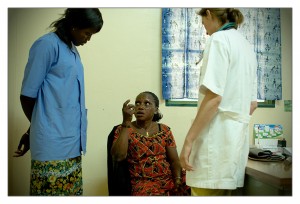 The situation for Mrs Sylla, 60-year old, seems hopeless. She has been having blood in her urine for the past six months. In research I discover a large tumor in the pelvis. Probably cervical cancer, a well-preventable disease. We pray with her and refer her to a gynecologist. But even when treatment is an option, it’ll probably be too expensive.
The situation for Mrs Sylla, 60-year old, seems hopeless. She has been having blood in her urine for the past six months. In research I discover a large tumor in the pelvis. Probably cervical cancer, a well-preventable disease. We pray with her and refer her to a gynecologist. But even when treatment is an option, it’ll probably be too expensive.
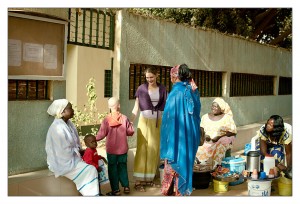 A radiant albino boy with – strangely enough – brown eyes walks in just to shake my hand on his way to his regular wound treatment. His pale skin is very fragile and he came in with several large wounds. The weeks of care have done him visibly well. My hope is that a national program will be developed, guaranteeing proper care for this special group of patients.
A radiant albino boy with – strangely enough – brown eyes walks in just to shake my hand on his way to his regular wound treatment. His pale skin is very fragile and he came in with several large wounds. The weeks of care have done him visibly well. My hope is that a national program will be developed, guaranteeing proper care for this special group of patients.
Magdalene a (Senegalese) nurse intern sits next to me in the consulting room. She’ll be with us for 3 months, before running a mission health post in a poor village. She will see many poor and often very sick people, without the referral opportunities we have available in the city. Her hope is that they will be up to this arduous task. Now she translates to Wolof for me while I teach her medical issues. I also help her to have an eye for the psychological and spiritual needs of the people. An encouraging word or a prayer is sometimes more effective than a pill.
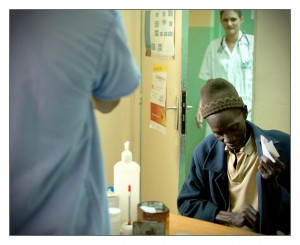 Mr. Thiam is half asleep in the waiting room. He has been working all night, with SENELEC, the energy company of Senegal. He comes for a new tube of ointment. Gratefully he says that this ointment finally cures his skin. For eight years he was been told that he had a fungal infection. This is common problem, but the anti-fungal ointment did not help at all. Now, with anti-eczema ointment, his complaint is resolved. When the power goes out halfway through our conversation, the importance of his work becomes evident… A dark skin is very difficult to assess with the light off…
Mr. Thiam is half asleep in the waiting room. He has been working all night, with SENELEC, the energy company of Senegal. He comes for a new tube of ointment. Gratefully he says that this ointment finally cures his skin. For eight years he was been told that he had a fungal infection. This is common problem, but the anti-fungal ointment did not help at all. Now, with anti-eczema ointment, his complaint is resolved. When the power goes out halfway through our conversation, the importance of his work becomes evident… A dark skin is very difficult to assess with the light off…
One of the nurses that does consultations comes with a hard case. A girl of 8 with oedema and renal impairment, two weeks after a respiratory infection. A post-streptococcal nephropathy? Nephrotic syndrome? Or the toxic effect of the traditional medications she took? I will never know the answer, because we can’t do the proper research. It is unfortunate that we have to refer some of the most interesting cases.
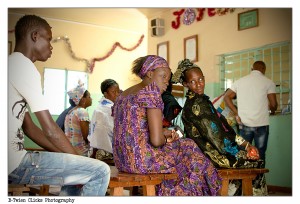 A mother comes entirely from Guinea-Bissau with her sick child. She is very poor and does not speak Wolof. I see a malnourished child of a year or two with severe pneumonia. A staff member can happily translate to her tribal language and we give its 10,000 CFA (15 euros), of the treatment in the hospital. If the child is restored from the infection may come to our feeding program for advice and follow-up.
A mother comes entirely from Guinea-Bissau with her sick child. She is very poor and does not speak Wolof. I see a malnourished child of a year or two with severe pneumonia. A staff member can happily translate to her tribal language and we give its 10,000 CFA (15 euros), of the treatment in the hospital. If the child is restored from the infection may come to our feeding program for advice and follow-up.
A medicine salesman is waiting impatiently at the door. Dressed in a fancy suit, with leaflets just as shiny as his freshly polished shoes. I always wonder why these companies are exactly focused on remedies for a cold, appetite generators and vitamin preparations. A French influence perhaps? In my opinion, these are pills that often provide false hope.
After the consultations, I drop by the lab to discuss the pros and cons of performing a Helicobacter Pylori rapid test (for upset stomach)
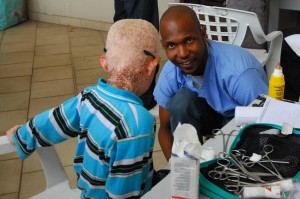 In the afternoon we have our weekly meeting with the consultants, these are the four nurses who do consultations. Weekly we discuss a clinical picture of which I and my British colleague then make a protocol. The dilemma today is about intestinal parasites, better known as worms… A stool test first? Threat blindly? Or only when there are complaints? Despite the cultural barriers a nice discussion develops. In the midst of it, Eve of the food corner walks in with meat sandwiches. We’ve earned it. But me and my colleagues hope we won’t get worms from them…
In the afternoon we have our weekly meeting with the consultants, these are the four nurses who do consultations. Weekly we discuss a clinical picture of which I and my British colleague then make a protocol. The dilemma today is about intestinal parasites, better known as worms… A stool test first? Threat blindly? Or only when there are complaints? Despite the cultural barriers a nice discussion develops. In the midst of it, Eve of the food corner walks in with meat sandwiches. We’ve earned it. But me and my colleagues hope we won’t get worms from them…
* For the sake of privacy, real names are not used.